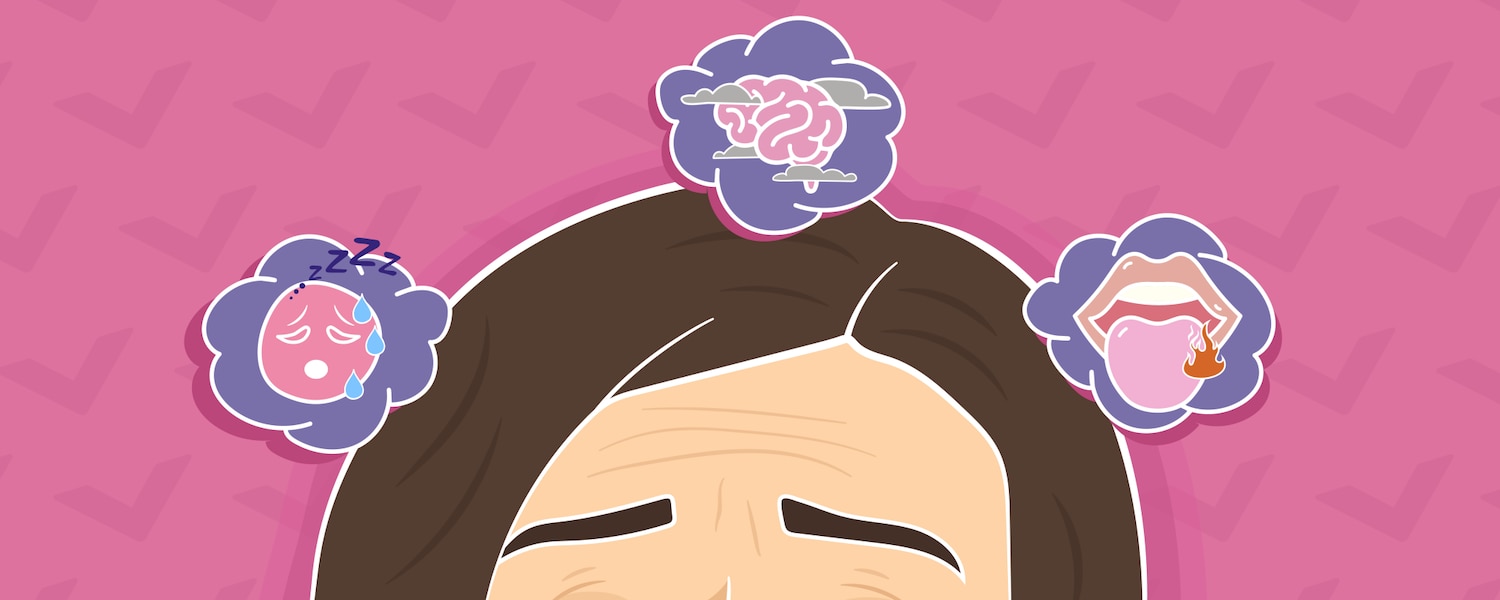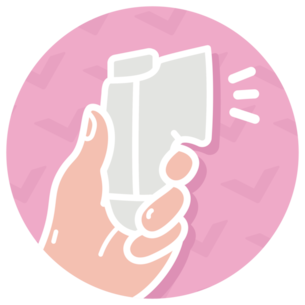What are the symptoms of menopause?

Menopause is a natural part of our lives, but that doesn't necessarily make it any easier to get to grips with. It can be confusing when your body changes in ways you might not expect. So, we're here to break down the symptoms and signs, why they happen, and the treatment options available to help make this process a bit easier.
Menopause can affect us both physically and emotionally – and not everyone will go through it in the same way. You might find the whole experience daunting, especially if your expectations don’t line up with what your friends or family might be going through. But try not to worry, we all experience it in our unique way, and that’s perfectly normal.
The best way to prepare for this challenging time is to keep an eye out for the symptoms of menopause and learn how to cope as your body gets ready to leave periods behind.
What is the first sign of menopause?
As you transition into menopause, your menstrual flow will become more irregular and eventually stop entirely. Unless there may be another explanation for this, such as pregnancy, irregular periods outside of your normal pattern usually mark the start of your menopause journey, also known as perimenopause. Even though some of us may rejoice at the idea of saying goodbye to the cramps and bloating we’ve dealt with throughout our menstruation years, it can still be confusing when any process in our body changes or stops.
Reaching out for support during this time can make a big difference when you’re feeling overwhelmed by your symptoms. Confiding in trusted friends or family and medical experts about your experience and how it is affecting you can go a long way in easing your mind.
Constantly learning more about the changes that happen in our bodies can also help navigate this journey with confidence. So why not sign up to our newsletter?
What are the physical symptoms of menopause?
Menopause can affect your body in different ways, and no two people will experience it in the exact same way. You may already recognise some of these physical symptoms, while others may be completely new to you. If you're going through this change and you're not sure what to look out for, these symptoms can feel daunting, but many are very common and usually nothing to be concerned about.
During menopause, you might experience these physical symptoms:
- Irregular periods
- Hot flushes and night sweats (sudden changes in body temperature that can make you feel very hot or very cold)
- Vaginal dryness and itching (this can sometimes be painful)
- Discomfort or pain during sex
- Palpitations (that feeling of your heart beating out of your chest)
- Aches and pains in your muscles and joints
- Weight gain
- Headaches and migraines (which can be worse than what you're used to)
- Reduced libido (lower sex drive)
- Difficulty sleeping
- Breast tenderness
- Dry skin (can be anywhere on the body)
- Nausea
Which menopause symptoms affect your mental health?
During menopause, you may experience some symptoms that affect you mentally:
- Low mood and mood swings
- Depression
- Anxiety
- Low self-esteem
- Brain fog (you find it difficult to concentrate and struggle with memory)
What is the most common symptom of menopause?
What are some less common symptoms of menopause?
Even if you're clued up on the more common menopausal symptoms, there are some that fewer of us will experience and aren't as widely known or talked about. It can be worrying when you start experiencing menopause symptoms that you’re not familiar with, so being aware of as many as possible can give you peace of mind.
Some less common menopause symptoms include:
- Thinning hair
- Changes in body odour (due to increased sweating from hot flushes and night sweats)
- Itchy skin and feeling like something is crawling on your skin
- Brittle nails
- Burning tongue
- Reduced spatial awareness (difficulty telling how close/far away things are from you)
- Voice changes
What are the symptoms of postmenopause?
Why do menopause symptoms happen?
How long do menopause symptoms last? Are they constant?
Can you go through menopause without symptoms?
What are my treatment options for menopause symptoms?
Even though menopause is unavoidable, you don't have to let the symptoms rule your life. Treatment is available to help keep your menopause symptoms under control and improve your quality of life, whether that’s fighting hot flushes and brain fog or managing nausea.
Hormone Replacement Therapy (HRT)



Tackling individual menopause symptoms
- Testosterone gel to increase sex drive
- Oestrogen to relieve vaginal dryness and discomfort
- Non-hormone-based medications to manage hot flushes
- Cognitive Behavioural Therapy (CBT) for mood disorders and anxiety
Protection for irregular periods and spotting
Finding hot flush triggers
Soothing vaginal dryness
Managing weight gain
Getting a good night’s sleep
Keeping your mind active
Medical disclaimer
The medical information in this article is provided as an information resource only and is not to be used or relied on for any diagnostic or treatment purposes. Please consult your doctor for guidance about a specific medical condition.
This article has been reviewed on 19th April 2024 by Karen Joash BSc (Hons), MSc, MBBS, MRCOG PGCert, ILM and MBA, Consultant Obstetrician and Gynaecologist at Queen Charlotte's and Chelsea Hospital and The Portland Hospital for Women and Children. You can find out more about mS Karen on her LinkedIn and X pages.
[References]
Continue learning


